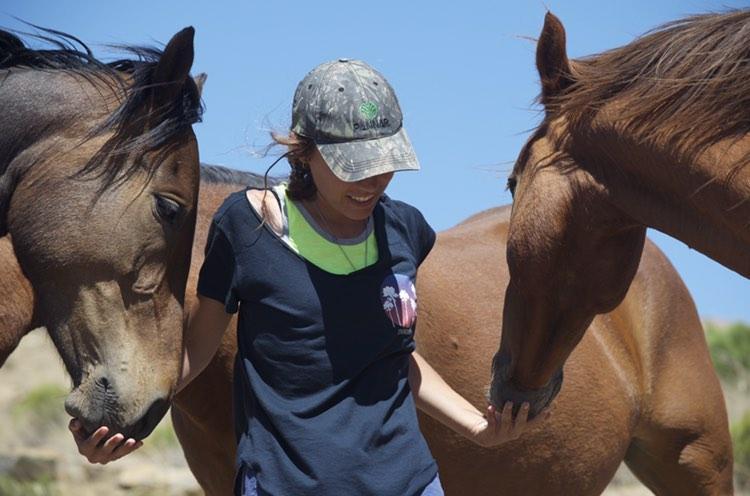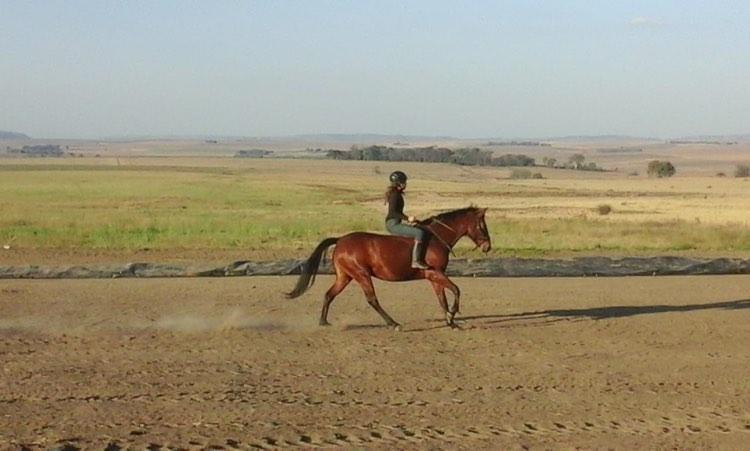Louisa Marais - Budoucnost je pozitivní

Koně jsou součástí života lidí tisíce let. Nosily nás do války, pomáhali nám pracovat na poli, vozili naše rodiny do měst a když jsme jednou za čas potřebovali relaxovat projížděli jsme se s nimi venku po krajině. Člověk koně stále vyhledává - děti se chtějí učit jezdit na klidných ponících, začínají jezdci přemýšlejí o závodění a soutěžích, farmáři a jejich důvěřivý koně nahánějí dobytek. Člověk a kůň vždy stáli při sobě. Kůň byl vždy podřízený člověku. Ale proč to takto musí být? Nejprve toho bylo dosahování působením bolesti a strachu, v současnosti jsou tyto metody stále používaný, ale na nižším stupni a méně viditelně, takže pro netrénované oko to může vypadat ,, jemně'', ale ve skutečnosti strach hraje stále primární roli při tréninku moderních koní. Po mnoho let si lidé myslí, že tato krásná stvoření nemají emoce, způsobujeme jim bolest a strach, abychom získali jejich poslušnost a ničíme jejich duši. Ano, mnoho koní poslouchá svého jezdce, ale ne proto, že by v něj měli důvěru, ale kvůli mysli zaplněné strachem a zlomené duši, protože ztratili silu bojovat. Nemají jinou možnost, než poslouchat a sloužit, je to jako otrok a jeho pán. Toto je bohužel pravda o tom, jak s koňmi zacházíme. Naštěstí to ale můžeme změnit a mnoho z nás již začalo.
Můj přechod na horsemenship byl postupný proces, a jako trenér se stále nepřestávám vzdělávat. Pocházím z prostředí tradičního jezdectví, ve svých jezdeckých začátcích jsem pracovala s koňmi tradičními metodami za použití strachu a bolesti. Brzy jsem ale začla vidět, jak tento způsob tréninku koně ničí a začala jsem používat jemnější metodu, nazývanou natural horsemanship - přirozená komunikace. Tato metoda má mnoho různých směrů. Viděla jsem pokrok a zlepšení, ale nikdy ne radost ze strany koně. Jejich duše byla stále zlomená, ikdyž se to stalo jemnějším způsobem. Toužila jsem po tom, objevit způsob tréninku, kde kůň zůstane svobodný, a unikátní osobnost každého koně nedotčená. Tehdy jsem nalezla pozitivní horsemanship a nezávislost a konečně se moji koně začali chtít účastnit tréninku, dokonce i bez toho, abych je o to musela žádat. Každý z mých koní mi uštědřil pořadnou lekci, donutil mně abych se podívala na vše do hloubky a začala se ptát PROČ? Díky tomu jsem se stala trenérkou, jakou jsem dnes.
Důležitý faktor, který si mnoho lidí neuvědomuje při tréninku koní je, že každý kůň je individuální osobnost a každý vnímá svět rozdílně. Můžete mít koně, který bude úplně v klidu vyzvete-li ho k práci v kruhové ohradě, jiný může ve stejné situaci utíkat a bláznit, a další s vámi může chtít bojovat. Musíme se naučit dívat se na koně individuálně a naučit se jejich úhlu pohledu.
For hundreds of years horses have been apart of our lives. They carried us through wars,
helped us with our work in the fields, took our families to town and when we needed to
relax they were once again there for a lovely ride in the countryside. We still find this today,
children being taught to ride on quiet ponies, the upcoming star rider carried through
competition by their horse, the farmer and his trusty horse rounding up cattle. Man and
horse have always been beside one another. The horse has always been submissive to man,
but why has this been so? At first it was attained by inflicting pain and fear in the horse, in
recent years these methods are still used but to a lesser degree and is much less obvious to
the untrained eye, it may even appear "gentle" to some, where in fact fear still plays the
primary role in training the modern horse. For many years we thought these beautiful
creatures had no emotions, we used pain and fear to attain "loyalty", broke their spirit and
claimed victory. So many horses are obedient towards their riders yes, but not due to trust,
but because of a broken spirit, a mind filled with fear, having lost all will to fight, who saw
no way out except to obey and submit, no different to a slave serving his master. This is the
unfortunate truth of the way we're treating them, luckily, we can change and many have
already started or done so years ago.
My change in horsemanship has been an ongoing process, as a trainer you never stop
learning and never stop evolving. Coming from a very traditional training background, I
began training horses through the traditional training methods, using pain as a tool and fear
as a weapon. I quickly saw the incredible damage this way of training caused, and the
emotional toll it took, so then I started using a gentler approach called natural
horsemanship, of which there are many different methods. I saw improvements and
progress but never a joy in the horses, their spirits were still broken even if it happened in a
more "gentle" manner. I longed for a way of training horses while keeping that wild, unique
personality of each horse intact. That's when I stumbled upon positive reinforcement and
autonomy, and finally my horses wanted to participate in training, without me even having
to ask. Each one of my horses had an important lesson to teach me, forcing me to look
deeper and ask the question WHY. They definitely made me the trainer I am today.
An important factor not many people consider when training horses is that each horse is an individual and perceives the world differently, you can have a horse who couldn't care less if you chased him around in the round pen (usually this is the horse who has learned what to do in order to get you to stop chasing him), or you can have one that'll run and totally freak out in the same situation, and another who will fight instead of flee. We have to look at
horses as individuals but also learn their way as a species. I believe the way to a more
harmonious, ethical and successful relationship with horses is via the use of positive
reinforcement and autonomy. I find autonomy to be the most important part of successful
training and in the training of a confident horse.
